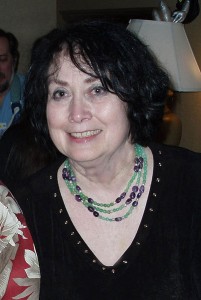 This interview was originally published in COSMOS Magazine, issue 50.
This interview was originally published in COSMOS Magazine, issue 50.
A sci-fi–fantasy blend about a mysterious woman with a multiverse to save, C.J. Cherryh’s first book was published in 1976. Since then, she has won numerous awards and delighted readers with more than 60 books. Her latest, Protector, the second installment of the fifth Foreigner trilogy, is expected in April. She talked to COSMOS reviews editor Rivqa Rafael about the genre and how she writes it.
RR: Why do you write science fiction?
CJC: Science fiction is what I read. As a child, I liked adventures, exploration, ‘what-ifs’ and fairy tales. I liked sea stories and memorised all the parts of a clipper ship before I was eight. And this was in landlocked Oklahoma. Before I was nine, I wanted to see mountains taller than the Wichitas and I wanted to see an ocean. I wanted to see a narwhal. I wanted to ride camels and explore the desert. I halfway believed in lost worlds.
Around that year, some fireworks blew up at a county fair display, so the show was cancelled. My father and I walked toward the parking lot, and I was dejected about the loss of the fireworks. And then my dad said urgently: “Look up!” He pointed to a shooting star. There was immediately another. And another. “Celestial fireworks,” he said, and we sat out there and watched the most magnificent meteorite fall I’ve ever seen. That was when I became aware of the heavens.
And when I was 10, at a summer camp, and needed a packet from home, my dad bought me a paperback book and included it with Mum’s gifts of cookies and the practicalities of clean underwear. It was Edgar Rice Burroughs’s Tarzan and the City of Gold. I was hooked. I read everything Burroughs wrote… and it was a short hop to John Carter of Mars, Flash Gordon, and to the wide universe. I became hooked onFlash Gordon – the Buster Crabbe version – and when the series ended, I was so bereft, I started writing my own stories with my own characters – because I had heard about plagiarism. I never stopped after that. I wrote obsessively, every day. And still do.
You’ve been praised for building intricate, believable worlds. How do you incorporate science into this process?
My academic background is in linguistics and the ancient world. I’ve studied geology, climatology, planetary weather, archaeology, history, anthropology and animal behaviour. When I build a world, it’s from the core outward, and evolution upward.
Your characters are often outsiders – the last of their kind, or separated from their species. Is this deliberate?
I like writing about other cultures… but you don’t [necessarily] get to know them if you place them in conflict, or have only one individual from that culture under a microscope. First contact is an interesting scenario, but in the real world of science, if it’s going to go well, it will take time. The Foreigner books, for instance, have the initial contact scenario – but the action starts two centuries later. And travelling about the world, often with only one companion, I’ve found myself in the outsider’s position, having to use my skills at interpretation and having to solve problems, while knowing very little about the language.
How would you describe your writing process, and do you have any writing tips?
My most basic hint is – study everything. Nothing on or off a planet, inside or outside of a star system, is irrelevant to your study. Even bubblegum pop is a phenomenon worth understanding. Think cosmically, and make it understandable for John and Jane Smith, householders, with a mortgage, and a life grown perhaps more sedentary than they ever wished. Give them adventures. Make them think. Carry them to places they need to go and make their lives happier. Writing? I can do that lying on a hillside watching the clouds go by.
You’ve made a strong push to provide e-books without digital rights management to your fans. What challenges have you faced?
It’s a continually moving target: formats change, formats die, new devices arrive, rights are in question, pirates try to claim your work as theirs, and getting your readers to know where to find your work is a challenge. But my readers are clever folk, and very good people. I maintain an online presence where I can talk and listen directly to readers, and they are beyond supportive and good-hearted. I always feel happy when I’ve been exchanging ideas with them.
Apart from Foreigner, what’s on your horizon?
I’ll be doing another in the Cyteen universe – and I’ll be looking, too, at some of my ‘orphaned’ series, series that one publisher brought out, and then that publisher evaporated, changed focus, or otherwise dissipated on me: and of course none of the other publishers want to take up an abandoned series in today’s market – and that has left a whole set of stories untold. So I’ll be putting out some new things in e-format only, under my own imprint. I’ll be thinking up new things. And I’ll be working steadily… three house moves in seven years kind of slowed me down, but I’m settled now in a very nice place – we’ve even built a koi pond – and life is good.
Image credit: Sharon Reynolds/Wikimedia